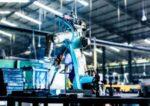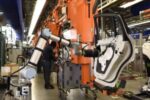Is 5G ready for manufacturing?
High profile scandals aren’t typically good for the technology sector. Whether it’s diesel emissions, large data breaches or cyber-attacks on mission-critical infrastructure, scandal has the power to cripple a technology even before it’s gotten off the ground. Despite what recent headlines may have you thinking, 5G has the potential to be a hugely positive force in the world of manufacturing, heralding in a new era of technological innovation. While 3G and 4G offered incremental improvements in speed and bandwidth, 5G will be the first cellular, wireless platform to truly offer reliable integration with machine-to-machine and industrial IoT systems. It will do this in three ways. The first is enhanced mobile broadband (eMBB); 5G offers peak data rates of 10 Gbps and can handle 10,000 times more traffic than its predecessors. Secondly, it offers Ultra Reliable Low Latency Communications (URLLC). This means it has a radio latency of less than 1 ms and an availability of over 99.9 per cent, making it ideal for industrial use where uptime is critical. Thirdly, it offers Massive Machine-type Communication (eMTC), allowing it to handle a density of one million devices per square kilometre. It can also deliver ultra low-cost machine-to-machine communications and can last up to 10 years on battery, great for battery operated low power devices. So, what does this mean for industry? Well, not only will 5G open the door for real-time wireless sensor networks and location and asset tracking, it will also enable plant managers in smart factories to rely on seamless communication with a fleet of autonomous guided vehicles (AGVs) without worrying about network dropouts. What’s more, manufacturers that may have been sceptical of adopting the likes of augmented and virtual reality technologies will be able to take full advantage of them for real-time simulation and predictive maintenance. In industrial […]










